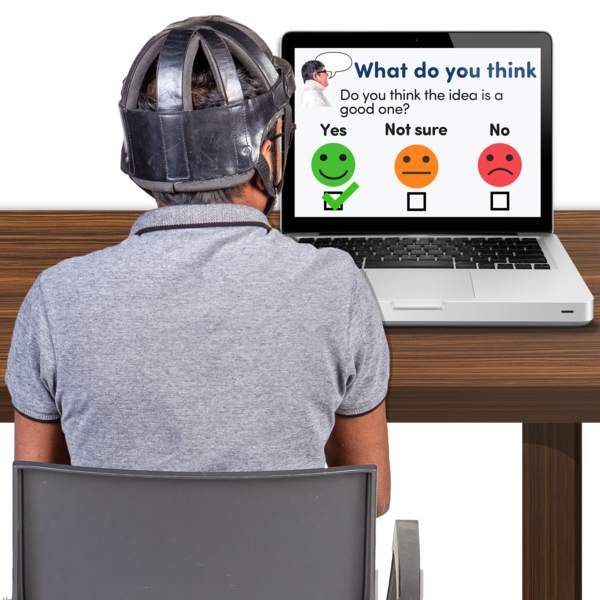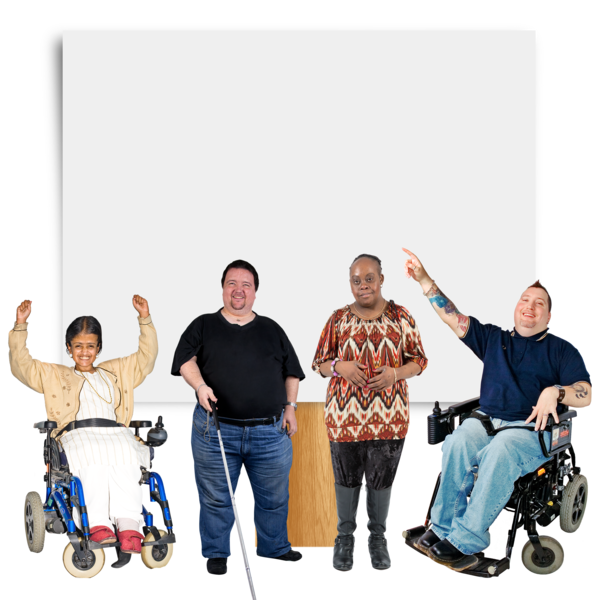New
survey
 A survey is when someone asks you to answer some questions.
results from the
learning disability
A survey is when someone asks you to answer some questions.
results from the
learning disability
 A learning disability is to do with the way someone's brain works. It makes it harder for someone to learn, understand or do things.
charity Mencap reveal that two thirds of people cannot correctly identify a learning disability as a reduced intellectual ability - with 40% of people thinking it’s
dyslexia
A learning disability is to do with the way someone's brain works. It makes it harder for someone to learn, understand or do things.
charity Mencap reveal that two thirds of people cannot correctly identify a learning disability as a reduced intellectual ability - with 40% of people thinking it’s
dyslexia
 Dyslexia is a learning difficulty. People who have dyslexia can find it hard to read, write and spell.
and 28% believing it to relate to a mental health issue. These figures rise the older people get, jumping from 32% of 25-34 year olds considering dyslexia to be a learning disability to 50% for over 55’s.
Dyslexia is a learning difficulty. People who have dyslexia can find it hard to read, write and spell.
and 28% believing it to relate to a mental health issue. These figures rise the older people get, jumping from 32% of 25-34 year olds considering dyslexia to be a learning disability to 50% for over 55’s.
There are 1.5 million people with a learning disability in the UK but the new figures – which have been released to coincide with the launch of Mencap’s ‘Talk To Me’
campaign
 A campaign is when people work together to try to change something.
as part of the charity’s 75th anniversary – highlight the continued lack of understanding around learning disability.
A campaign is when people work together to try to change something.
as part of the charity’s 75th anniversary – highlight the continued lack of understanding around learning disability.
Some of the reasons for the lack of understanding could include low visibility and representation in the media. The survey reveals two in five people (42%) have not seen someone with a learning disability in the media in the past year. Again, the older demographic state that they are less likely to have seen someone with a learning disability in the media in the past year, with over half (56%) of those aged over 55 stating this. This compared to just a fifth (19%) of 16-24 year olds. This could demonstrate the lack of visibility correlates with the lack of understanding.
The results show just how much of an impact the media can make, with a third (33%) saying they would feel more comfortable talking to someone with a learning disability if they saw them featured more often in the media. Shows such as Line of Duty - featuring Tommy Jessop who has Down’s syndrome – and Mencap ambassador George Webster who recently made history when he became the first CBeebies presenter who has Down’s syndrome, are helping with this but Mencap say more is needed.
Mencap ambassador George Webster comments:
“When I was younger, there wasn’t anyone with a learning disability or Down's Syndrome on the TV. It is so important though - if people saw more people with a learning disability in the media, they would better understand what a learning disability is and they would be less scared to approach someone and talk to them. Then they could get to know them better. This would also mean people treat us better - it could improve things massively.
“I've been over the moon with all the positive feedback since I joined CBeebies and I've been feeling super proud, especially when people say it means a lot to them. I think it will help people understand more about Down's Syndrome and learning disability as they can learn more about me and see that we're not that different.
“I just want everyone to treat people with a learning disability fairly and to not judge us - talk to us and get to know us before assuming anything.”
Alongside a lack of visibility in the media, Mencap suspects that minimal contact with people with a learning disability in society may contribute to the lack of understanding around the needs of people with a learning disability, as well as some people’s negative attitudes. Almost a fifth (18%) of people say they have never spoken to someone with a learning disability - or not since they were at school – and over a quarter (27%) agree they would feel apprehensive about talking to someone with a learning disability for the first time [i].
The survey also revealed there are signs the public have an appetite to learn more about learning disability. Anxieties about how to adjust the way they speak are causing 40% of adults to feel uncomfortable about talking to someone with a learning disability.
As well as a lack of understanding, the figures sadly reveal over six in 10 of adults (64%) have witnessed someone be rude to or about a person with a learning disability at some point in their lifetime. Almost a third (31%) also admitted they themselves have engaged in offensive or disrespectful behaviour at some point, such as telling a joke, doing an impression of someone with a learning disability, or ignoring someone.
To celebrate the charity’s 75th anniversary – and highlight the need for greater progression, understanding and inclusion of people with a learning disability - Mencap is launching its ‘Talk To Me’ campaign. The campaign provides a set of tools available to access online which will help with people’s lack of understanding of learning disability. Included in these online resources is a
pledge
 A pledge is when someone promises to do something.
that the charity is encouraging people to sign to stand up for the
rights
A pledge is when someone promises to do something.
that the charity is encouraging people to sign to stand up for the
rights
 Rights are the things everyone should be allowed to do like have a say, or go to school.
of people with a learning disability; a video from people with a learning disability about what their learning disability means to them; a guide about communicating with people with a learning disability and a quiz to test people’s knowledge of learning disability.
Rights are the things everyone should be allowed to do like have a say, or go to school.
of people with a learning disability; a video from people with a learning disability about what their learning disability means to them; a guide about communicating with people with a learning disability and a quiz to test people’s knowledge of learning disability.
Saskia, who has a learning disability, said:
“I think everyone should understand more about learning disability. For me, things have been so much better since I’ve become a football coach. It has helped people in my community
A community is the people and places in an area. get to know me, learn about what people with a learning disability are capable of and made me feel so much more confident in the rest of my life also.
“Everyone with a learning disability should be included and people should not worry about language – just be kind and use normal language. I just want to talk to people like anyone else and if you just talk to us and get to know us, you’ll see just how much we can do.”
Edel Harris, Chief Executive of the learning disability charity Mencap, said:
“For 75 years, Mencap has campaigned with people with a learning disability, their families and carers to create positive change. We have seen huge progress but we know there is still a long way to go, and it’s clear from these new statistics just how many misconceptions still exist. People with a learning disability can and should be active participants in society, yet many people don’t know what a learning disability is or have little contact with people with a learning disability. We are encouraging people to educate themselves about learning disability through our ‘Talk To Me’ resources online.
“We want the UK to be the best place in the world for people with a learning disability to live happy and healthy lives. Mencap began in a time when the world was completely different for people with a learning disability and we have seen a lot of progress in society’s attitudes and behaviours since then – but we still need to see even bigger change.”
For more information on the Talk To Me campaign and resources to help with understanding and inclusion of people with a learning disability visit here: https://mencap.org.uk/mencap75th
- ENDS -
Notes to Editors
For further information or to arrange an
interview
 An interview is a meeting where you talk to someone or a group of people about something. When you have an interview for a job, you have to answer questions and say why you would be good at the job. The person who gives the best answers is offered the job.
with a Mencap
spokesperson
An interview is a meeting where you talk to someone or a group of people about something. When you have an interview for a job, you have to answer questions and say why you would be good at the job. The person who gives the best answers is offered the job.
with a Mencap
spokesperson
 A spokesperson is someone who speaks up about something. They usually speak up on behalf of a group or
organisation
A spokesperson is someone who speaks up about something. They usually speak up on behalf of a group or
organisation
 An organisation are a group of people who work together.
.
or
case study
An organisation are a group of people who work together.
.
or
case study
 A case study is a piece of writing that tells people more information about someone's experience.
, please contact Mencap’s media team on: media@mencap.org.uk or 020 7696 5414 (including out of hours).
A case study is a piece of writing that tells people more information about someone's experience.
, please contact Mencap’s media team on: media@mencap.org.uk or 020 7696 5414 (including out of hours).
Survey
Survey conducted by Opinion Matters, surveying 2,001 nationally
representative
 A representative is also called a rep. A representative is someone who speaks up for everyone in their group or team.
UK adults, between 01.10.2021 – 05.10.2021. Opinion Matters abides by and employs members of the Market Research Society which is based on the ESOMAR principles.
A representative is also called a rep. A representative is someone who speaks up for everyone in their group or team.
UK adults, between 01.10.2021 – 05.10.2021. Opinion Matters abides by and employs members of the Market Research Society which is based on the ESOMAR principles.
[i] Combination of ‘Strongly agree’ and ‘Somewhat agree’ in response to the corresponding statement
About Mencap
There are approximately 1.5 million people with a learning disability in the UK. Mencap works to support people with a learning disability, their families and carers by fighting to change laws, improve services and access to
education
 Education is when you learn things. When you fill in a form to get a job, education means you write where you went to school, college or university.
,
employment
Education is when you learn things. When you fill in a form to get a job, education means you write where you went to school, college or university.
,
employment
 Employment means having a job.
and
leisure
Employment means having a job.
and
leisure
 Leisure is when you have time to do things you enjoy like playing sports or going to the pub.
facilities. Mencap supports thousands of people with a learning disability to live their lives the way they want: www.mencap.org.uk
Leisure is when you have time to do things you enjoy like playing sports or going to the pub.
facilities. Mencap supports thousands of people with a learning disability to live their lives the way they want: www.mencap.org.uk
For advice and information about learning disability and Mencap services in your area, contact Mencap’s Freephone Learning Disability Helpline on 0808 808 1111 (10am-3pm, Monday-Friday) or email helpline@mencap.org.uk.
What is a learning disability?
- A learning disability is a reduced intellectual ability which means that people might need support with everyday tasks – for example shopping and cooking, or travelling to new places – which affects someone for their whole life;
- Learning disability is NOT a mental illness or a learning difficulty, such as dyslexia. Very often the term ‘learning difficulty’ is wrongly used interchangeably with ‘learning disability’;
- People with a learning disability can take longer to learn new things and may need support to develop new skills, understand difficult information and engage with other people. The level of support someone needs is different with every individual. For example, someone with a severe learning disability might need much more support with daily tasks than someone with a mild learning disability.